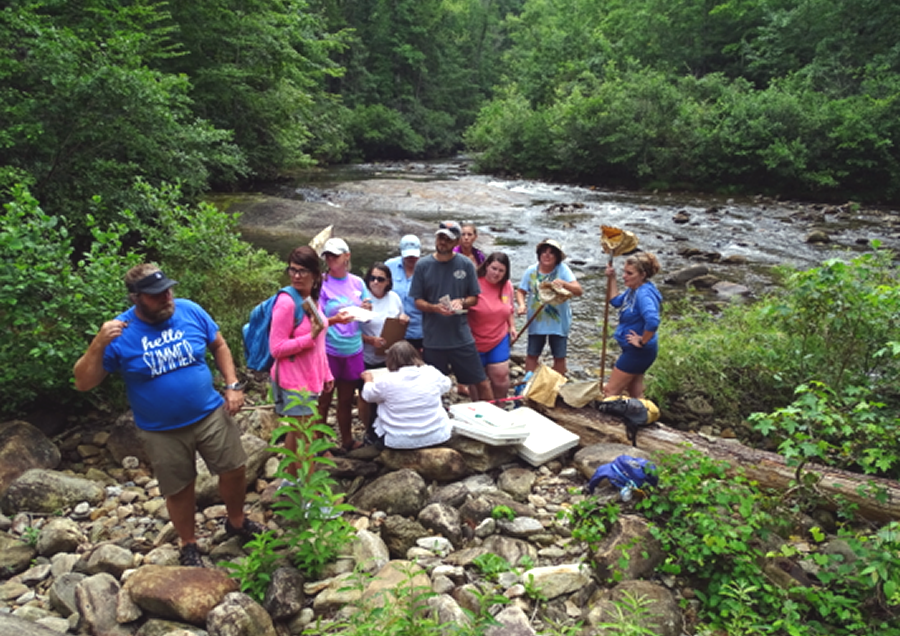CLEMSON – What do aquatic insect hunting, water quality assessment, conducting a bear census and studying the effect of power generation on the environment have in common?
For Andrea Isengard from J.L. Mann High School in Greenville, these were all components of a successful environmental education course she completed this summer.

The Duke Energy Foundation awarded Clemson University $50,000 from its environmental program to support “Natural History and Ecology of Bad Creek Hydroelectric Station and Jocassee Gorges.” The grant, awarded to Barbara Speziale and John Hains of Clemson, supported two environmental education courses this summer for 18 K-12 teachers from across South Carolina and will support another next summer.
Hains, associate professor of biological sciences, Patricia Whitener of Greenville County Cooperative Extension, Allan Boggs of Duke Energy and retired South Carolina Department of Natural Resources biologist Skip Still collaborated to instruct the courses, which included online learning modules and a week of hands-on field studies at the Duke Energy Bad Creek Outdoor Classroom near Salem.
Whitener, who has worked with the courses since their start in 2012, said she looks forward to this course each year.
“It’s a chance for educators to renew their own love of learning and curiosity about the natural world,” Whitener said. “When teachers are excited, it’s easy to get the students interested in exploring the world outside their classroom walls.”
The participants focused on the interrelationships of energy production, water resources and environmental stewardship during the courses. To successfully complete their summer course, participants developed and shared lesson plans they will use with their students during the academic year.
“I’m grateful for the instructors’ enthusiasm and wide range of activities,” Isengard said. “I begin another new school year with a freshly acked ‘teacher toolbox’, [complete with] exciting new lessons including animal imprints, field guides and an ‘Adopt a Stream’ invertebrate lab. I can’t wait to share these activities with my biology students and infuse enthusiasm through wildlife preservation.”
The Duke Energy funds specifically supported Clemson tuition for course participants, transportation to the field sites, lunches at field sites, housing at Clemson and the books and other instructional materials teachers can use in their classrooms.
Speziale, associate director of the Watt Family Innovation Center and professor of biological sciences, has worked with the Duke Energy Foundation since 2012 to develop and present this course at the Bad Creek Outdoor Classroom.
“The courses offer unique environmental education learning experiences, in that they directly interrelate societal demand for energy with environmental impacts – and do so in the context of understanding how power is produced in our own backyards, by our local power company,” Speziale said. “The connections with Duke Energy are invaluable for this experience, as is evident in the comments by our K-12 teacher participants.”
The Duke Energy Foundation supports environmental education and research, one of its guiding principles, with grants such as this one.
“Education is an important focus for Duke Energy’s charitable giving,” said Kodwo Ghartey-Tagoe, South Carolina president of Duke Energy. “Well-rounded teachers are vital to helping students learn and grow. The sessions at our Bad Creek Hydroelectric Station provide rich, hands-on learning opportunities outside of the classroom that strengthen teachers’ knowledge about the environment.”
Isengard said she is grateful for the opportunity Duke Energy provided when supporting this course again in 2018.
“I am grateful to both Duke Energy and Clemson University instructors for sponsoring this wonderful program,” Isengard said. “This is truly a unique professional development [experience] and one of the most memorable of my teaching career. I want to especially thank the instructors and staff of Duke Energy for their tireless efforts in community outreach. This program will positively impact students throughout the state by generous learning resource donations. It is evident that Duke takes its commitment to environmental education seriously.”
The grant will support a new course to be offered in summer 2019. Interested teachers who work in Duke Energy service areas should contact Speziale at bjspz@clemson.edu or 864-656-1550.
END
Duke Energy
Headquartered in Charlotte, North Carolina, Duke Energy is one of the largest energy holding companies in the U.S., with approximately 29,000 employees and a generating capacity of 49,500 megawatts. The company is transforming its customers’ experience, modernizing its energy grid, generating cleaner energy and expanding its natural gas infrastructure to create a smarter energy future for the people and communities it serves.
Get in touch and we will connect you with the author or another expert.
Or email us at news@clemson.edu

